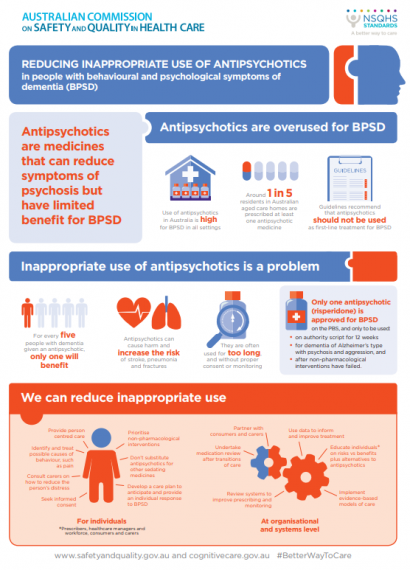Evidence on the use of PROMs in clinical practice, clinical research, quality improvement and policy development.
The Commission has identified a set of six elements for comprehensive care delivery, which represent different stages or processes that a patient may experience when clinical care is delivered in alignment with the Comprehensive Care Standard.
The Commission has developed a series of fact sheets for consumers and carers about the NSQHS Standards (second edition) and the accreditation process.
The Commission has translated some key information for consumers into community languages.
Monitoring, measuring and evaluating consumer partnerships is vital to ensure that these partnerships achieve their objectives and meet the needs of patients, carers, families, consumers, the workforce and the health service.
The Commission has developed range of resources describing the attributes of high-performing person-centred healthcare organisations.
Seven key attributes common in high-performing person-centred healthcare organisations have been identified. Collectively, the seven attributes provide an ideal organisational model for supporting consistent and excellent person-centred care.
The Commission has developed an online education module on shared decision-making that focuses on communicating risk.
The National statement on health literacy is Australia’s national approach to addressing health literacy.
Person-centred care is widely recognised as a foundation to safe, high-quality health care. It is care that respects and responds to the preferences, needs and values of patients and consumers.
Immobility, such as that associated with extended bed rest in hospital, can cause pressure injuries. Pressure injuries are a major contributor to the care needs of patients within the health industry, and in the majority of cases, pressure injuries are preventable
Falls are a significant cause of harm for older people. The Commission has updated the best practice guidelines for preventing falls and harm from falls in older people.
To focus care on patients' needs, and determine the most appropriate model of care for the patient, it is important that health services identify and assess patients' risk of harm.
These FAQs answer some common questions about the Comprehensive Care Standard, and more generally what comprehensive care means in the Australian health system.
The purpose of the National consensus statement: essential elements for safe and high-quality paediatric end-of-life care is to describe the core requirements for delivering the best possible care for children at the end of life.
The Commission has developed the National Consensus Statement: Essential elements for safe high-quality end-of-life care which describes the key clinical and organisational requirements for delivering excellent end-of-life care.
The Commonwealth, state and territory governments across Australia are increasing their focus on improving the safety and quality of end-of-life care.
Reviewing the delivery of comprehensive care is important for ensuring patients are receiving care that meets their clinical and personal needs; that risks are efficiently and effectively identified and mitigated; that the agreed comprehensive care plan is achieving what it aimed to; and that patient goals and expectations are being met.

